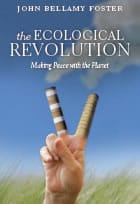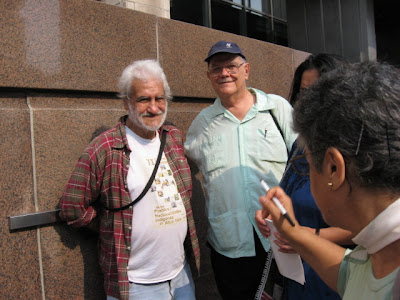environment
Women’s rights, population and climate change: The debate continues
Introduction
Climate and Capitalism recently published a debate between Betsy Hartmann and Laurie Mazur about campaigns that promote family planning and reproductive health programs as means of slowing population growth and fighting global warming.
The site subsequently published a reply to Laurie Mazur in which Ian Angus argued: “The combination of population reduction and women’s rights was already like oil and water. Adding CO2 reductions to the mix only makes things worse.”
John Bellamy Foster on `Marx's Ecology' and `The Ecological Revolution'

John Bellamy Foster interviewed by Aleix Bombila

By Ram Seegobin, Lalit de Klas
February 8, 2010
Dear leaders of Greenpeace [UK],
We understand that your organisation has taken a position in favour of the British government’s outrageous plan to create a “marine park” on territory which is not its own, thus tricking ill-informed people into supporting the British state on rather vague grounds of “the environment”, while they are in fact banishing the people who lived there and flaunting the Charter of the United Nations.
Michael Lebowitz: `The Four Rs' of global capitalism
By Michael A. Lebowitz
February 19, 2010 -- Correo del Orinoco -- In Venezuela, people know what the 3Rs stand for: revise, rectify and re-impulse. Like Karl Marx, who stressed that the revolution advances by criticising itself, President Hugo Chavez has argued that it is necessary to recognise errors and to go beyond them in order to advance.
`Population Justice' -- Blaming Third World women for global warming
By Ian Angus
January 31, 2010 -- Climate and Capitalism -- For more than two centuries, the idea that the world’s ills are caused by poor people having too many babies has been remarkably successful at diverting attention from the complex social causes of poverty and injustice.
Forty years ago, Paul Ehrlich’s bestseller The Population Bomb applied the idea to environmental problems:
The causal chain of deterioration is easily followed to its source. Too many cars, too many factories, too much detergent, too much pesticide, multiplying contrails. Inadequate sewage treatment plants, too little water, too much carbon dioxide – all can be traced easily to too many people.[1]
Ehrlich’s book convinced many environmentalists, and led to the formation of a variety of groups that focused solely on the supposed evils of overpopulation.
Today, as women’s rights activist Betsy Hartmann warns in a recent article, populationist arguments are back – but now groups such as the US-based Population Connection (formerly Zero Population Growth) and the UK’s Optimum Population Trust have added a “faux feminist twist” to their attacks on the reproductive rights of Third World women.
John Bellamy Foster: The crisis of capital: economy, ecology and empire
From pdxjustice Media Productions on Vimeo.
Professor of sociology and editor of Monthly Review, John Bellamy Foster, talks about the triple crises in the economy, the environment, and the imperial wars and occupations in Iraq, Afghanistan and beyond..
People are not pollution -- Why climate activists should not support limits on immigration
The 350 ppm carbon dioxide challenge and how to achieve it

By Renfrey Clarke
January 14, 2010 -- The target posed by leading NASA climate scientist James Hansen of stabilising atmospheric carbon dioxide at 350 parts per million (ppm) is increasingly understood in conjunction with the need to keep cumulative emissions within a tight global “budget”. While the point at which budgeted emissions occur is not in theory crucial, in practice there is a need to ensure that emissions peak early and decline swiftly thereafter.

Hugo Blanco (left).
By Hugo Blanco, translated by Richard Fidler for Links International Journal of Socialist Renewal
The concentration of greenhouse gases (GHGs) in the atmosphere is already so high that the climate system has been brought out of balance. The CO2 concentration and global temperatures have increased more rapidly in the last 50 years than ever before on Earth, and will rise even faster in the coming decades. This adds to a multitude of other serious ecological imbalances, the impacts of which threaten the lives and livelihoods of the people of the world, most acutely, impoverished people and other vulnerable groups.
John Bellamy Foster: Why ecological revolution?

By John Bellamy Foster
Bolivia: Invitation to the Peoples’ World Conference on Climate Change and Mother Earth’s Rights
January 5, 2010 -- Considering that climate change represents a real threat to the existence of humanity, of living beings and our Mother Earth as we know it today;
Noting the serious danger that exists to islands, coastal areas, glaciers in the Himalayas, the Andes and mountains of the world, the poles of the Earth, warm regions like Africa, water sources, populations affected by increasing natural disasters, plants and animals, and ecosystems in general;
Making clear that those most affected by climate change will be the poorest in the world who will see their homes and their sources of survival destroyed, and who will be forced to migrate and seek refuge;
Confirming that 75% of historical emissions of greenhouse gases originated in the countries of the global North that followed a path of irrational industrialisation;
Noting that climate change is a product of the capitalist system;